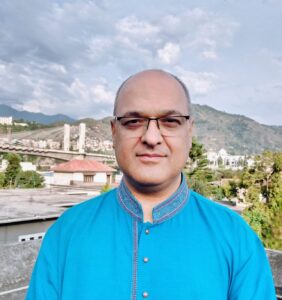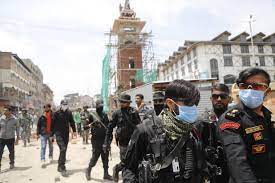 Abdul Basit Alvi
Abdul Basit Alvi
India, which holds the presidency of the G20 for 2023 will be holding the G20 summit/sessions/tracks in what is widely acknowledged as the Indian Illegally Occupied Jammu & Kashmir Region. The Group of Twenty (G20) is the premier forum for international economic cooperation. It plays an important role in shaping and strengthening global architecture and governance on all major international economic issues. India holds the Presidency of the G20 from 1 December 2022 to 30 November 2023.
The G20 was founded in 1999 after the Asian financial crisis as a forum for the Finance Ministers and Central Bank Governors to discuss global economic and financial issues. The G20 was upgraded to the level of Heads of State/Government in the wake of the global economic and financial crisis of 2007, and, in 2009, was designated the “premier forum for international economic cooperation”. The G20 Summit is held annually, under the leadership of a rotating Presidency. The G20 initially focused largely on broad macroeconomic issues, but it has since expanded its agenda to inter-alia include trade, sustainable development, health, agriculture, energy, environment, climate change, and anti-corruption. The G20 Presidency is responsible for bringing together the G20 agenda in consultation with other members and in response to developments in the global economy.
The Group of Twenty (G20) comprises 19 countries (Argentina, Australia, Brazil, Canada, China, France, Germany, India, Indonesia, Italy, Japan, Republic of Korea, Mexico, Russia, Saudi Arabia, South Africa, Türkiye, United Kingdom and United States) and the European Union. The G20 members represent around 85% of the global GDP, over 75% of the global trade, and about two-thirds of the world population.
India’s decision to host a meeting of Group of 20 (G20) countries in Srinagar, part of Indian-administered Kashmir, has been slammed by Pakistan, which called it an “irresponsible move”. In a foreign ministry statement , Pakistan expressed its “strong indignation” after the Indian government announced Srinagar as the venue for the G20 Tourism Working Group meeting scheduled to take place from May 22 to 24. “India’s irresponsible move is the latest in a series of self-serving measures to perpetuate its illegal occupation of Jammu and Kashmir in sheer disregard of the United Nations Security Council resolutions and in violation of the principles of the United Nations Charter and international law. Pakistan vehemently condemns these moves,” the statement read. “Such events cannot hide the reality of Jammu and Kashmir being an internationally recognized dispute that has remained on the agenda of United Nations Security Council for over seven decades,” the Pakistani statement added. “For a country that has a grandiose vision about itself, and its place in the world, India has once more demonstrated that it is unable to act as a responsible member of the international community.”
Readers, The Himalayan territory of Kashmir has been a flashpoint between India and Pakistan since they gained independence from British rule in 1947. The two nuclear-armed neighbours have fought three wars, two of which were over Kashmir. The Kashmir issue further flared up four years ago when India’s Hindu nationalist government, headed by Prime Minister Narendra Modi, revoked Article 370 of the Constitution of India, which granted Indian-administered Kashmir partial autonomy.
India have been continuously involved in human rights violations in Occupied Kashmir which were also pointed out by Amnesty International Indian Chapter last year. According to that report, Indian authorities must ensure a prompt, independent and impartial investigation into the recent unlawful killings of civilians by armed groups in Kashmir, Amnesty International India said . The killings of three people belonging to the Hindu minority community adds to the long-standing violence against civilians that has been escalating since the unilateral revocation of Jammu & Kashmir’s special autonomy on 5 August 2019 by the Government of India.
“The Indian authorities must take urgent steps for the protection of the people of Kashmir. For decades, people of Jammu & Kashmir have suffered from gross human rights violations and abuses . The sheer impunity with which the human rights of the people of Jammu & Kashmir have been systematically disregarded by Indian authorities must end if we are to fulfil the rights of victims and help ensure that such abuses against civilians are not repeated,” said Aakar Patel, chair of Amnesty International India Board. Since the revocation of Jammu & Kashmir’s special status in 2019, the Indian authorities, have arrested many human rights defenders including journalists and activists under the Unlawful Activities (Prevention) Act, India’s primary counter-terrorism law. At least 36 journalists have faced interrogation, raids, threats or physical assault for their reporting until now. According to Access Now, people in Jammu & Kashmir faced at least 85 internet shutdowns in 2021 – one of the highest in the world. The shutdowns were imposed for long periods of time and in violation of India’s Supreme Court that held that internet shutdowns must satisfy the tests of necessity and proportionality. According to the digital rights organization, these shutdowns were imposed as part of “counterterrorism” measures.
Report further says that even though, the Indian authorities have claimed a significant improvement in the security situation in Jammu & Kashmir, the Armed Forces (Special Powers) Act remains on the law books. The legislation officially tasks the security forces with protecting civilians, upholding national security and combatting violence by armed groups. However, in the name of security operations, security force personnel have historically committed many grave human rights violations – including torture, rape and extrajudicial executions – which have gone unpunished. The failure to address these abuses have violated the rights of the victims to justice and remedy, which is enshrined in the Constitution of India and the international human rights law. It is not too late for the Government of India to take meaningful steps towards creating an inclusive and safe society instead of peddling a false notion of normalcy in the region and encouraging the perpetration of more abuses. Until then, the Indian government’s historical failure to protect the people of Kashmir will keep feeding into this never-ending cycle of abuses and impunity,” said Aakar Patel.
Pakistani and Kashmiris around the globe are protesting against holding G20 in Occupied Kashmir. Accroding to information received from reliable sources, on 11th may, in a bid to discourage G20 members from accepting Indian invite to participate in a controversial G20 meeting in Indian Illegally occupied Kashmir (IIoJK), United Kingdom based Kashmiris illustrious rights outfit Tehreek-e-Kashmir UK launched a digital campaign in the UK. According to Tehreek-e-Kashmir (TeK) UK, a digital van highlighting disputed nature of IIoJK is visiting all embassies of G20 member nations in London. It will also visit the British parliament and other important places in London to remind the G20 member nations that “accepting Indian invite disregard UN mandate and international law on IIoJK,” said Fahim Kayani, leader of TeK. The digital campaign urged the G20 member nations to boycott the Indian event in IIoJK while urging the nations to end colonization of Kashmir by India. “Holding any event related to G20 in Kashmir violates UN resolutions as it enables genocide committed by India,” said Kayani. “Rise to occasion and hold India accountable on IIoJK,” Kayani said, addressing the G20 nations. He reminded the G20 member states that Kashmir was a disputed territory whose destiny was yet to be decided by its people. “Attending any international event in IIoJK at India’s invitation makes these nations complicit in crimes committed by India,” he said, warning the world’s top 20 economies to respect international law. “Our campaign is to make these G20 nations aware of India’s reality behind holding such an event in IIoJK,” said Kayani. “Indian propaganda machinery has led these G20 nations thinking that everything is honky dory in IIoJK but the reality is that India is holding Kashmir hostage at gun point.”
Readers, India is trying to hide the real situation of Kashmir from the entire world by holding this summit there. India is pretending that everything is normal in Occupied Kashmir which is totally wrong and has been identified by independent sources. The world should force India to stop victimizing Kashmiris and give them a right to self determination as per UN resolutions.



